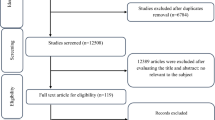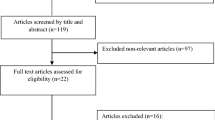Abstract
Purpose
Selenium (Se) is a trace element having significant effects on human metabolism. Recent studies suggest that Se supplementation have a pivotal effect on the inflammatory markers. Therefore, the aim of this study was to assess the effect of Se supplementation on plasma inflammatory markers including C-reactive protein (CRP) and high-sensitivity C-reactive protein (hs-CRP) and nitric oxide (NO) as a stress oxidative index, among patients with metabolic diseases.
Methods
To assess the effects of Se on the inflammatory markers, following the PRISMA-P guidelines, we systematically searched ISI/WOS, PubMed/MEDLINE, and Scopus for studies that assessed the effect of Se supplementation on the inflammatory markers. Data extraction was performed by two independent investigators. Using the random effects or fixed-effects model depending on the results of heterogeneity tests was used to estimate the pooled standardized mean difference (SMD). Heterogeneity between studies was assessed using Cochran's Q test and I2 index.
Results
The initial search revealed 3,320 papers. After screening process and considering inclusion criteria, 7 publications were eligible for inclusion in the meta-analysis. The meta-analysis results showed that Se supplementation did not significantly affect CRP and hs-CRP concentrations (mean difference (MD) = -0.15; 95% CI: -0.55- 0.23; P = 0.43). Subgroup analysis of CRP type showed that Se supplementation significantly decreased hs-CRP level (pooled SMD = -0.44; 95% CI: -0.67–0.21). Moreover, no significant change was observed in NO level by continuing to take Se supplementation, (pooled SMD: 0.003, 95%CI: -0.26, 0.26).
Conclusions
This study revealed that Se supplementation would have desirable effects on cardio-metabolic indicators through affecting the levels of inflammatory markers. Given the importance of concerns, more attention should be given to more prospective studies with longer follow-up.





Similar content being viewed by others
Data availability
The dataset supporting the conclusions of this article is included within the article.
Abbreviations
- SMD:
-
Standardized mean difference
- CI:
-
Confidence interval
- Se:
-
Mineral selenium
- CRP:
-
C-reactive protein
- IL:
-
Interleukins
- TNFα:
-
Tumor necrosis factor-α
- RCTs:
-
Randomized control trials
- PCOS:
-
Polycystic ovary syndrome
- GDM:
-
Gestational Diabetes
- CHD:
-
Coronary heart disease
References
Rayman MP. The importance of selenium to human health. The lancet. 2000;356(9225):233–41.
Faghihi T, Radfar M, Barmal M, Amini P, Qorbani M, Abdollahi M, et al. A randomized, placebo-controlled trial of selenium supplementation in patients with type 2 diabetes: effects on glucose homeostasis, oxidative stress, and lipid profile. Am J Ther. 2014;21(6):491–5.
Ravn-Haren G, Bügel S, Krath B, Hoac T, Stagsted J, Jørgensen K, et al. A short-term intervention trial with selenate, selenium-enriched yeast and selenium-enriched milk: effects on oxidative defence regulation. Br J Nutr. 2008;99(4):883.
Sun W, Wang Q, Guo Y, Zhao Y, Wang X, Zhang Z, et al. Selenium suppresses inflammation by inducing microRNA-146a in Staphylococcus aureus-infected mouse mastitis model. Oncotarget. 2017;8(67):110949.
El-Bayoumy K, Sinha R, Richie JP Jr. Forms of selenium in cancer prevention. Diversity of Selenium Functions in Health and Disease. 2015;38:137.
Nicastro HL, Dunn BK. The Selenium and Vitamin E Cancer Prevention Trial (SELECT): prevention of prostate cancer using selenium and/or vitamin E in the SELECT cancer prevention trial. Selenium2015. p. 428–57.
Benstoem C, Goetzenich A, Kraemer S, Borosch S, Manzanares W, Hardy G, et al. Selenium and Its Supplementation in Cardiovascular Disease—What do We Know? Nutrients. 2015;7(5):3094.
Alissa E, Bahijri S, Ferns G. The controversy surrounding selenium and cardiovascular disease: a review of the evidence. Medical science monitor: international medical journal of experimental and clinical research. 2003;9(1):RA9.
Shargorodsky M, Debby O, Matas Z, Zimlichman R. Effect of long-term treatment with antioxidants (vitamin C, vitamin E, coenzyme Q10 and selenium) on arterial compliance, humoral factors and inflammatory markers in patients with multiple cardiovascular risk factors. Nutr Metab. 2010;7:55.
Alizadeh M, Safaeiyan A, Ostadrahimi A, Estakhri R, Daneghian S, Ghaffari A, et al. Effect of L-arginine and selenium added to a hypocaloric diet enriched with legumes on cardiovascular disease risk factors in women with central obesity: a randomized, double-blind, placebo-controlled trial. Ann Nutr Metab. 2012;60(2):157.
Abramson SB. Nitric oxide in inflammation and pain associated with osteoarthritis. Arthritis Res Ther. 2008;10(2):S2.
Farrokhian A, Bahmani F, Taghizadeh M, Mirhashemi S, Aarabi M, Raygan F, et al. Selenium supplementation affects insulin resistance and serum hs-CRP in patients with type 2 diabetes and coronary heart disease. Hormone and metabolic research= Hormon-und Stoffwechselforschung= Hormones et metabolisme. 2016;48(4):263.
Kamath DY, Xavier D, Sigamani A, Pais P. High sensitivity C-reactive protein (hsCRP) & cardiovascular disease: An Indian perspective. Indian J Med Res. 2015;142(3):261–8.
Luan Y-y, Yao Y-m. The clinical significance and potential role of C-reactive protein in chronic inflammatory and neurodegenerative diseases. Frontiers in Immunology. 2018;9(1302).
Morrow DA, Ridker PM. C-reactive protein, inflammation, and coronary risk. The Medical clinics of North America. 2000;84(1):149–61, ix.
Djalalinia S, Khosravi M, Hasani M, Moghaddam SS, Atoofi MK, Mahdavi-Gorabi A, Noroozi M, Qorbani M, Asayesh H, Soleimani A. Effects of selenium supplementation on cardiometabolic risk factors, inflammatory, and antioxidant markers: A systematic review and meta-analysis protocol. International Journal of Preventive Medicine. 2019;10.
Razban MM, Eslami M, Bagherzadeh A. The relationship between serum levels of hs-CRP and coronary lesion severity. Clujul Med. 2016;89(3):322–6.
Sproston NR, Ashworth JJ. Role of C-reactive protein at sites of inflammation and infection. Frontiers in immunology. 2018;9:754-.
Wei J, Zeng C, Gong Q-y, Yang H-b, Li X-x, Lei G-h, et al. The association between dietary selenium intake and diabetes: a cross-sectional study among middle-aged and older adults. Nutrition Journal. 2015;14.
Lu C-W, Chang H-H, Yang K-C, Kuo C-S, Lee L-T, Huang K-C. High serum selenium levels are associated with increased risk for diabetes mellitus independent of central obesity and insulin resistance. BMJ Open Diabetes Research & Care. 2016;4(1).
Heinrich CJ. Evidence-based policy and performance management: Challenges and prospects in two parallel movements. The American Review of Public Administration. 2007;37(3):255–77.
Djalalinia S, Ramezani-Tehrani F, Malekafzali H, Hejazi F, Peykari N. Development and evaluation of a nutritional health program for adolescents. Iran J Nurs Midwifery Res. 2013;18(5):425.
Peykari N, Tehrani F, Eftekhari M, Malekafzali H, Dejman M, Neot R, et al. A peer-based study on adolescence nutritional health: a lesson learned from Iran. JPMA The Journal of the Pakistan Medical Association. 2011;61(6):549.
Schulz KF, Altman DG, Moher D. CONSORT 2010 statement: updated guidelines for reporting parallel group randomised trials. BMC Med. 2010;8(1):18.
DerSimonian R, Laird N. Meta-analysis in clinical trials. Control Clin Trials. 1986;7(3):177–88.
Higgins JP, Thompson SG, Deeks JJ, Altman DG. Measuring inconsistency in meta-analyses. BMJ: British Medical Journal. 2003;327(7414):557.
Egger M, Smith GD, Schneider M, Minder C. Bias in meta-analysis detected by a simple, graphical test. BMJ. 1997;315(7109):629–34.
Asemi Z, Jamilian M, Mesdaghinia E, Esmaillzadeh A. Effects of selenium supplementation on glucose homeostasis, inflammation, and oxidative stress in gestational diabetes: Randomized, double-blind, placebo-controlled trial. Nutrition (Burbank, Los Angeles County, Calif). 2015;31(10):1235.
Razavi M, Jamilian M, Kashan Z, Heidar Z, Mohseni M, Ghandi Y, et al. Selenium supplementation and the effects on reproductive outcomes, biomarkers of inflammation, and oxidative stress in women with polycystic ovary syndrome. Hormone and metabolic research= Hormon-und Stoffwechselforschung= Hormones et metabolisme. 2016;48(3):185.
Murer S, Aeberli I, Braegger C, Gittermann M, Hersberger M, Leonard S, et al. Antioxidant supplements reduced oxidative stress and stabilized liver function tests but did not reduce inflammation in a randomized controlled trial in obese children and adolescents. J Nutr. 2014;144(2):193.
Brigelius-Flohe R, Banning A, Kny M, Böl G-F. Redox events in interleukin-1 signaling. Archives of biochemistry and biophysics. 2004;423(1):66–73.
Acknowledgements
The authors are thankful of the team working on this study and all participants who made this experience.
Funding
This study was funded by the Alborz University of Medical Sciences.
Author information
Authors and Affiliations
Contributions
The concept of this study was proposed by S.D., M.Q., This study was designed S.D., M.Q., M.H., Data extraction was done by H.A., H.-S.E., A.K., M.Z., F.B., H.R., A.M.G., Analysis or interpretation was performed by M.Q., S.D, Literature search was done by S.D. This study was written by S.D., M.Q. All authors read and approved the final manuscript.
Corresponding author
Ethics declarations
Conflict of Interest
The authors declare no conflicts of interest.
Additional information
Publisher's Note
Springer Nature remains neutral with regard to jurisdictional claims in published maps and institutional affiliations.
Rights and permissions
About this article
Cite this article
Djalalinia, S., Hasani, M., Asayesh, H. et al. The effects of dietary selenium supplementation on inflammatory markers among patients with metabolic diseases: a systematic review and meta-analysis of randomized controlled trials. J Diabetes Metab Disord 20, 1051–1062 (2021). https://doi.org/10.1007/s40200-021-00821-3
Received:
Accepted:
Published:
Issue Date:
DOI: https://doi.org/10.1007/s40200-021-00821-3




